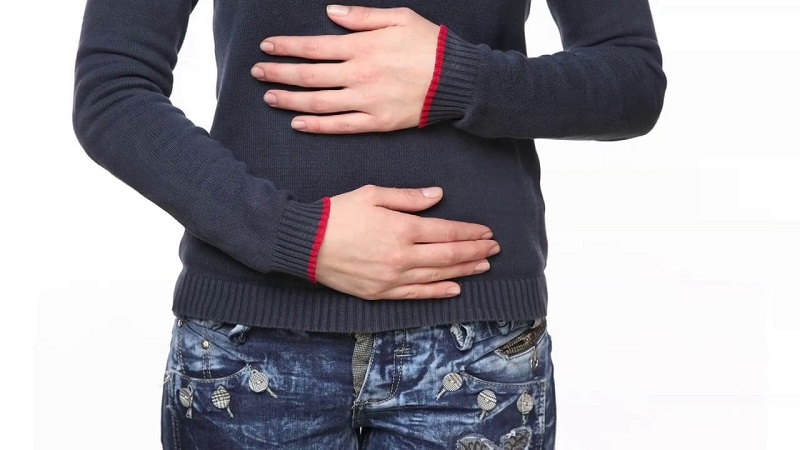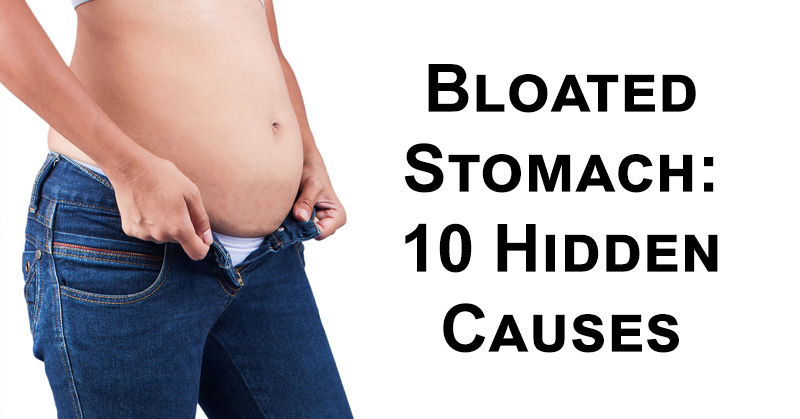If you suffer from chronic stomach bloating, you’re not alone. In fact, stomach bloating has become so common it’s considered an epidemic. The westernized diet, which is often very poor, contributes to this epidemic. Additionally, high levels of stress, prescription drugs, and exposure to pollution and toxins can all add to the bloated sensation. The trouble is, bloating isn’t just about feeling full or experiencing gas. It can be a lot more serious than that. Bloating, for example, is among candida symptoms. Find out more about what could be causing your bloated stomach be reading below.

Here are 10 possible causes of your bloated stomach:
1. Digestive Disorders
Various digestive disorders could be causing your bloated stomach. Those who suffer from IBS, ulcerative colitis and celiac disease often deal with bloating, gas, distension, and other distressing symptoms. (1)
In fact, some reports show that 23 to 96 percent of people who have IBS experience bloating. Fifty percent of those with functional dyspepsia also experience bloating, and 56 of those with chronic constipation experience bloating as well.
2. Fluid Retention (Called Edema or Ascites)
Bodily fluids can, at times, build up around the body. Common places for this to occur are near the abdomen or pelvis area, and it causes excess bloating as well as temporary weight gain. If you have fluid retention, you may notice that your jewelry doesn’t fight like it used to.
However, this fluid retention could be a sign of a serious underlying condition. For example, an abdominal infection, liver disease, and, though it’s rare, even cancer can cause fluid retention. (2) Be sure to check for other symptoms of liver failure or hepatitis, such as yellowing of the skin, changes in the white color of your eyes, or pain in the abdomen. Stomach cancer doesn’t often show early symptoms. However, in addition to a bloated stomach, you may also see unexplained weight loss, indigestion, nausea, blood in vomit, and abdominal pain.
3. Dehydration

Chances are, you’ve noticed a bloated stomach the day after you’ve eaten a lot of salty foods or consumed alcohol. You were likely dehydrated, too. When you don’t get enough water, your body holds onto the water it does have. This leads to bloating.
Furthermore, when you don’t drink enough water, you might find you experience constipation. And when you finally drink fluids, then, they are stored around your midsection, making you feel extra puffy. Be sure to drink enough water every day and cut back on salty foods and alcohol consumption.
4. Constipation
This could be the most likely reason you have a bloated stomach. If you have to “go” but you can’t, it could mean stool is backed up in the intestines, leaving you with a hard-feeling gut, pain, discomfort and gas. If you’re experiencing constipation, try adding more fiber into your diet. Also, be sure to drink plenty of water and avoid a sedentary lifestyle.
5. Food Allergies or Sensitivities

It could be hidden food allergies, sensitivities or intolerances that are causing your bloated stomach. Common culprits are dairy products, food that contain gluten, and a kind of carbohydrates called FODMAPs.
An elimination diet can help you pinpoint what it is that is making you bloated. A food intolerance means your body can’t properly break the food item down and digest it.
6. SIBO
It could be bacterial growth that is causing your bloated stomach. Small intestinal bacterial overgrowth, or SIBO, is caused by large amounts of abnormal bacteria living in the digestive tract, typically in the bowel. In fact, some foods can cause SIBO symptoms, including FODMAPS, which can sometimes ferment abnormally during the digestion process.
7. Infection
Fighting an infection can cause your stomach to bloat, as well. Infections trigger inflammation, due to the elevation of white blood cell count. Be sure to check for a fever, redness and pain, and swollen lymph nodes. These symptoms can often accompany a serious infection. (3)
8. Bowel Obstruction
In some cases, a severe case of stomach bloat may be a symptom of a bowel obstruction. Other symptoms of this include constipation, nausea, and vomiting. A bowel obstruction can be caused by scar tissue or a tumor in either the small intestine or the colon. When these grow and press against the bowel, the bowels become blocked and hold in fluid as well as stool. This is an extremely painful experience. It’s crucial you see your doctor right away if you suspect you may have a bowel obstruction, as it can lead to a ruptured bowel.
9. Hormonal Changes
PMS can also cause a variety of digestive issues, including bloating. This is common and is nothing that should cause too much concern. Some women can experience sever water retention for up to two weeks. However, if you have irregular periods, fibroids, or severe cramping, you may have an underlying medical condition.
10. Cancer
Usually, this is not what causes bloating in the majority of cases. However, one sign of uterine or colon cancer is bloating. If you can’t seem to get rid of the bloat even after trying suggested remedies, speak to your doctor about what could be causing this symptom.
When you’re experiencing bloating, be sure to check for other symptoms. This can help you and your doctor narrow down what may be causing the bloating.
Check for other symptoms such as:
- A fever
- Skin rashes or hives
- Watery eyes, itchy throat and other signs of allergic reaction
- Constipation or diarrhea
- Vomiting or nausea
- Blood in your urine or stool
- Unintentional weight loss
- Trouble going to the bathroom
- Pain around your lymph nodes, including in your groin, throat or armpits
- Fatigue
- Brain fog and trouble concentrating
- Irregular periods
- Hemorrhoids


